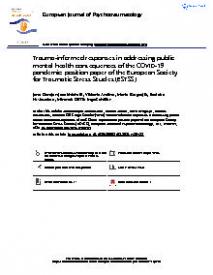Trauma-informed responses in addressing public mental health consequences of the COVID-19 pandemic : position paper of the European Society for Traumatic Stress Studies (ESTSS)
The COVID-19 pandemic has changed life in Europe and globally. The pandemic affects both individuals and the broader society across many domains, including physical and psychological
health, the economy and general welfare. The measures taken to counteract the pandemic have significantly altered daily life and, along with the threat of contracting the coronavirus and uncertainties surrounding future developments, created a complex system of stressors with a negative impact on public mental health.
This paper aims to outline the ESTSS strategy to address mental health issues related to COVID-19 and focuses on (1) trauma-informed policies, (2) capacity building, (3) collaborative
research and (4) knowledge-exchange. To facilitate implementation of a traumainformed approach and appropriate measures, ESTSS has developed a toolkit of recommendations on mental health and psychosocial assistance to be provided during the different phases of crisis and its aftermath. To promote capacity building, ESTSS offers a certification programme based on a curriculum in psychotraumatology and corresponding on-line training to the European community of mental health professionals. To assure evidencebased approaches and methods tailored to current circumstances, ESTSS has initiated a pan-European research project with international cooperation aimed at studying the mental health consequences of the pandemic, with a focus on psychological trauma and other stress-related reactions. To foster knowledge-exchange, the European Journal of Psychotraumatology (EJPT), the official journal of ESTSS, is publishing a special issue on COVID-19.
In: European Journal of Psychotraumatology ; ISSN: 2000-8066 | 11 | 1 | 1780782
https://doi.org/10.1080/20008198.2020.1780782


